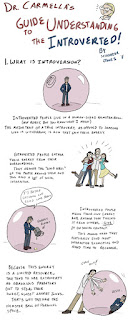Introverts are known to avoid small talk, because they find it to be a source of anxiety, or at least annoyance. For many quiet types, chit-chat can feel phony and meaningless.
“Let's clear one thing up: Introverts do not hate small talk because we dislike people," Laurie Helgoe writes in Introvert Power: Why Your Inner Life Is Your Hidden Strength. "We hate small talk because we hate the barrier it creates between people.”
2. You go to parties, but not to meet people.
If you're an introvert, you may sometimes enjoy going to parties, but chances are you're not going because you're excited to meet new people. At a party, most introverts would rather spend time with people they already know and feel comfortable around. If you happen to meet a new person that you connect with, great...but meeting people is rarely the goal.

3. You often feel alone in a crowd.
Ever feel like an outsider in the middle of social gatherings and group activities, even with people you know? If you tend to find yourself feeling alone in a crowd, you might be an introvert. We might let friends or activities pick us, rather than extending our own invitations.
4. Networking is a chore to avoid.
Networking (AKA small-talk with the end goal of advancing your career) can feel particularly disingenuous for introverts, who crave authenticity in their interactions. Introverts are advised to network in small, intimate groups rather than at large mixers.
5. People think you're "intense."
Are you jazzed by deep, philosophical conversations and a love of thought-provoking books and movies? Introverts like to research and discuss topics they find meaningful, and which they're passionate about.
 6. You're easily distracted.
6. You're easily distracted. While extroverts tend to get bored easily when they don't have enough to do, introverts get easily distracted and overwhelmed in environments with an excess of stimulation, and prefer quiet and relatively unexciting environments.
 |
| Source |
One of the most fundamental characteristics of introverts is that they need time alone to recharge their batteries. Whereas an extrovert might get bored or antsy spending a day at home alone with tea and a stack of magazines, this sort of down time feels necessary and satisfying to an introvert.
8. Giving a talk in front of 500 people is less stressful than having to mingle with those people afterwards.
Introverts can be excellent leaders and public speakers -- and they don't necessarily shy away from the spotlight. Performers like Lady Gaga, Christina Aguilera and Emma Watson all identify as introverts, and an estimated 40 percent of CEOs have introverted personalities. Instead, an introvert might struggle more with individually meeting and greeting large groups of people.
9. When you get on the bus, you sit at the end of the bench -– not in the middle.
Whenever possible, introverts tend to avoid being surrounded by people on all sides, and sit in places where they can get away easily when they're ready to. For example, when an introvert goes to the theater, the aisle or the back row are the preferred seating options.
 10. You start to shut down after you’ve been active for too long.
10. You start to shut down after you’ve been active for too long.Do you start to get tired and lethargic after you've been out and about for an extended period of time? It's likely because you’re trying to conserve energy. Everything introverts do in the outside world causes them to expend energy, after which they'll need to go back and replenish their stores in a quiet environment. Without a nearby quiet place to go, many introverts will resort to zoning out.
11. You're in a relationship with an extrovert.
It's true that opposites attract, and introverts frequently gravitate towards outgoing extroverts who encourage them to have fun and not take themselves too seriously.
 |
| Source |
12. You'd rather be an expert at one thing than try to be great at everything.
The dominant brain pathways introverts use is one that allows you to focus and think about things for a while, so they’re geared toward intense study and developing expertise, according to Dr. Marti Olsen Laney.
13. You actively avoid anything that might involve audience participation.
Because really, there is nothing more terrifying.
14. You screen all your calls -- even from friends.
You may not pick up your phone even from people you like, but you’ll call them back as soon as you’re mentally prepared and have gathered the energy for the conversation. For example, one introvert said, "To me, a ringing phone is like having somebody jump out of a closet and go 'BOO! I like having a long, nice phone call with a friend -- as long as it's not jumping out of the sky at me."
 |
| Source |
15. You notice details that others don't.
The upside of being overwhelmed by too much stimuli is that introverts often have a keen eye for detail, noticing things that others around them miss. Research has found that, compared to extroverts, introverts exhibit increased brain activity when processing visual information.
16. You have a constantly running inner monologue.
Extroverts tend to talk things through. Most introverts need to think first and discuss later.
17. You’ve been called an “old soul" since you were a kid.
Introverts observe and take in a lot of information, and they think before they speak, leading them to appear wise to others.
 18. Your environment tends to sap your energy.
18. Your environment tends to sap your energy. Neurochemically speaking, things like huge parties just aren’t your thing. Extroverts and introverts differ significantly in how their brains process experiences through "reward" centers.
Researchers demonstrated this phenomenon by giving Ritalin -- the ADHD drug that stimulates dopamine production in the brain -- to introverted and extroverted college students. The study "suggests that introverts have a fundamental difference in how strongly they process rewards from their environment, with the brains of introverts weighing internal cues more strongly than external motivational and reward cues," explained LiveScience's Tia Ghose.
 |
| Source |
When describing the way that introverts think, psychologist Carl Jung explained that they're more interested in ideas and the big picture rather than facts and details. Of course, many introverts excel in detail-oriented tasks -- but they often have a mind for more abstract concepts and discussion as well.
20. You’ve been told to “come out of your shell.”
Many introverted children come to believe that there's something "wrong" with them if they're naturally less outspoken and assertive than their peers. Introverted adults often say that as children, they were labeled as uninterested daydreamers who chose to not participate in class "like the others."
 |
| Source |
21. You’re a writer.
Introverts are often better at communicating in writing than in person, and many are drawn to the solitary, creative profession of writing. Most introverts -- like "Harry Potter" author J.K. Rowling -- say that they feel most creatively charged when they have time to be alone with their thoughts.
22. You alternate between phases of work and solitude, and periods of social activity.
Introverts know how much they need to balance solitude with social activity. But when they overdo it -- possibly by over-exerting themselves with too much socializing and being overly busy-- they get stressed and need to retreat to recharge. This may manifest as going through periods of heightened social activity, and then balancing it out with a period of inwardness and solitude.
23. You cancel plans to go out or to be with others more often than not.
At the time you schedule social get-togethers, you're either feeling equipped to have that kind of contact or it's difficult to say no. When the day of the event comes, however, your energy levels might not be able to handle it, and you reschedule.
______________________________________________________________
So...what's the verdict? Are you an "innie?" While writing this post I was surprised to find myself in each of these characteristics. Upon much internal deliberation (natch!), I declare that I am an introvert. What a relief to know that there's a valid explanation for my need for solitude and inner reflection to recharge!
 |
| Image Source |
Source: Huntington Post
(c) 2012-2016 Robyn King. All Rights Reserved.







































